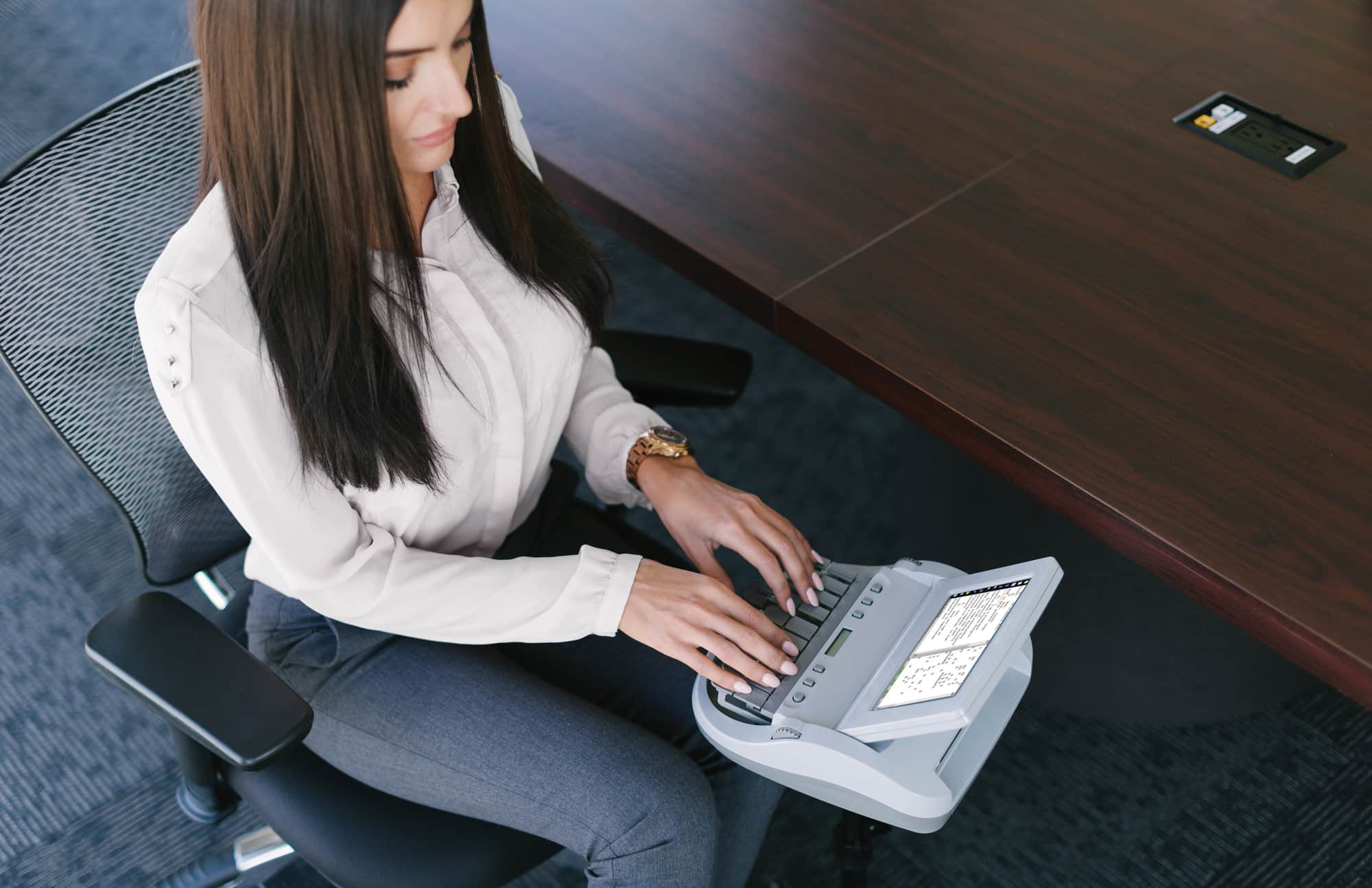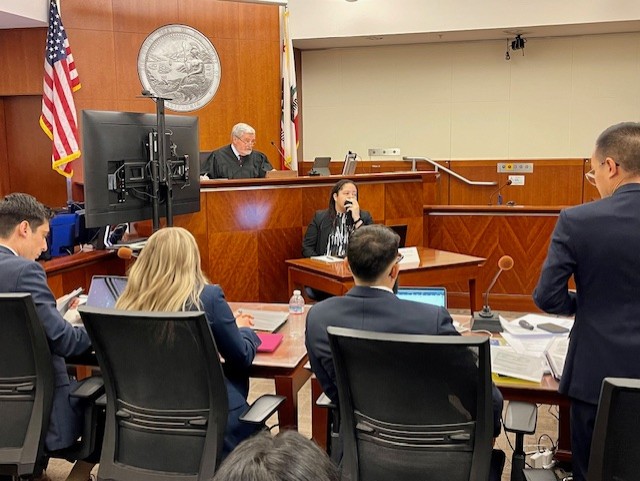
The Future of Court Coverage: Advancements and Patterns Shaping the Sector
As you check out the future of court reporting, you'll observe a change driven by innovation and advancement. Real-time transcription and AI applications are reshaping exactly how legal procedures are documented. With remote depositions gaining traction, the landscape is advancing quickly. It raises inquiries concerning the duty of stenotype reporter and the abilities they'll require moving on. What does this mean for experts in the field? The solution may surprise you.
The Effect of Artificial Intelligence on Court Reporting
As fabricated knowledge continues to advance, it's improving the landscape of court coverage in ways you might not anticipate. AI can examine vast quantities of lawful message, helping you identify pertinent criteria and simplify instance preparation.
Moreover, AI can enhance the prep work procedure by using predictive analytics, which can help you prepare for test end results based on historic information. This isn't practically replacing tasks; it's regarding enhancing your capabilities. With AI dealing with routine tasks, you can concentrate more on your core responsibilities, such as making sure precision and supplying important legal insights. Accepting these modifications can position you as a forward-thinking professional in a changing market.
Real-Time Transcription: Enhancing Precision and Effectiveness
Real-time transcription has actually reinvented the court reporting process, making it less complicated than ever before for you to capture exact documents instantly. With advanced innovation, you can now give prompt records throughout hearings or depositions, making sure that all parties have accessibility to important information without hold-up. This immediacy not only enhances the total effectiveness of the legal procedure yet also enables you to concentrate on the dialogue, instead of scrambling to catch up.
As you utilize real-time transcription, you'll see a significant reduction in mistakes, thanks to automated checking tools that flag disparities as you kind. Furthermore, clients value the ability to examine records instantly, allowing quicker decision-making and smoother procedures. By accepting this technology, you're not just improving your process; you're setting a new criterion in court reporting that focuses on precision and performance. This forward-thinking method placements you at the leading edge of the advancing legal landscape (court reporting).
The Rise of Remote Depositions

With the growing need for flexibility in lawful procedures, remote depositions have become a game-changer in court reporting. You can now take part in depositions from anywhere, eliminating travel time and expenses. This benefit allows you to focus on what really matters-- preparing your situation.
Remote depositions use innovative innovation, making it possible for real-time interaction and paper sharing. You can involve with witnesses and lawyers effortlessly, making sure that every person stays linked despite their physical place. This method not just saves time however also broadens your pool of professional witnesses, as geographical barriers become less of an issue.
As remote depositions gain popularity, it's vital to adapt to this brand-new standard. Familiarize yourself with the needed devices and methods to guarantee a smooth experience - court reporting. Welcoming this technology can give you a competitive side, allowing you to navigate the ever-evolving landscape of lawful proceedings efficiently
Digital Courtrooms: Changing the Legal Landscape
As you step right into the world of electronic courts, you'll notice how online hearing innovation is improving legal process. This shift not just makes accessibility much easier but also improves transcription accuracy, guaranteeing every word is recorded correctly. Accepting these improvements can considerably enhance the efficiency of the lawful procedure.
Digital Hearing Modern Technology
While the traditional courtroom setting has long been an icon of justice, the rise of digital hearing technology is reshaping just how legal proceedings are carried out. You'll find that these electronic systems offer unprecedented availability, permitting individuals to join from anywhere. This versatility not just saves time however also decreases costs connected with travel and logistics. Visualize being able to offer your instance without stepping foot in a physical court room. In addition, online hearings can enhance involvement, making it possible for witnesses and specialists to provide testimony without the restraints of place. As you adapt to these modifications, you'll notice that digital hearings preserve the honesty of the legal procedure while embracing innovation, eventually changing the method justice is offered in the contemporary world.
Improved Transcription Accuracy
Improved transcription precision is changing the lawful area, making court procedures more trustworthy than ever before. With advancements in speech recognition innovation and AI-driven devices, you can anticipate to see a considerable reduction in transcription errors. These advancements not just over at this website record every word talked but likewise make up nuances in tone and context, boosting total comprehension. Consequently, important details aren't shed in translation, ensuring that the honesty of the legal procedure is kept. In addition, real-time transcription allows you to access accurate documents instantaneously, facilitating smoother interaction throughout trials. Embracing these modern technologies means you're tipping into a future where clarity and accuracy in legal paperwork are extremely important, inevitably profiting all events entailed in the judicial system.
The Duty of Court Reporters in Virtual Hearings
Stenotype reporter play a necessary function in digital hearings, assuring that every word talked is properly captured and recorded in real-time. As a court reporter, you assist in interaction between celebrations, making complex lawful proceedings obtainable. Your experience in lawful terminology and the capacity to quickly adapt to different audio speakers are crucial in this digital environment.
During online hearings, you preserve an unwavering focus, even among technical obstacles or distractions. You Full Report provide a clear, written document that can be referenced later on, helping judges, lawyers, and clients understand the process. Your abilities in steering different platforms guarantee that you can seamlessly incorporate right into any kind of online configuration.
Furthermore, you also assist maintain the integrity of the judicial procedure, confirming that every participant's voice is heard. By doing this, you not only boost the effectiveness of lawful process yet additionally add to the overall justness and transparency of the justice system.
Developments in Documentation and Record Maintaining
As innovation progresses, technologies in documentation and record maintaining are transforming how stenotype reporter record and handle legal records. You'll locate that digital tools permit quicker and a lot more exact transcription, reducing the chances of human mistake. Cloud-based storage space solutions enable you to safely store and gain access to documents from anywhere, making collaboration with lawful groups seamless.
Man-made knowledge is also playing a substantial role, helping with real-time transcription and even providing smart editing features. These advancements not only improve efficiency but also assure that you can give top notch documentation in a fast-paced lawful environment.
Moreover, the integration of voice recognition software program improves the process, permitting you to focus much more on the subtleties of the process rather than simply typing. By welcoming these developments, you're positioned to elevate your skills and meet the demands of modern court reporting effectively.
Future Abilities and Training for Court Reporters
While technology reshapes the landscape of lawful procedures, it's essential for court reporters to adjust by obtaining new abilities and training. You'll require to acquaint yourself with advanced transcription software and electronic coverage devices to remain affordable. Accepting expert system and real-time captioning will enhance your efficiency and accuracy.
Furthermore, developing strong research and logical abilities is vital. You'll commonly run into intricate legal jargon and procedures, so understanding Click This Link lawful ideas will hone your reporting. On-line courses and workshops can give beneficial understandings right into these locations.
Connecting with other experts will certainly additionally assist you stay upgraded on industry patterns. Signing up with companies or going to conferences can expose you to brand-new modern technologies and best techniques.
Lastly, honing your social abilities will certainly boost communication with lawyers and customers. By concentrating on these locations, you'll place yourself for success in the developing field of court reporting.
Often Asked Questions

What Certifications Are Required to Become a Stenotype Reporter Today?
To come to be a stenotype reporter today, you'll need a high college diploma, specialized training in court reporting, and certification, typically with a nationwide exam. Strong typing skills and interest to information are crucial for success.
Just How Can Court Reporters Remain Updated With New Technologies?
To remain updated with brand-new technologies, you should go to workshops, join expert companies, and subscribe to pertinent magazines. Connecting with peers and joining on the internet discussion forums can also maintain you educated concerning the most current innovations.
What Is the Ordinary Wage for Court Reporters Currently?
The typical salary for court reporters varies by location and experience, however you can anticipate around $50,000 to $70,000 yearly. In some locations, experienced reporters can earn also extra, particularly with specialized skills.
Exist Task Opportunities for Court Reporters in Non-Legal Area?
Yes, there are job possibilities for court press reporters in non-legal fields. You can locate functions in closed captioning, transcription solutions, and media, where your skills in recording talked language are highly valued and looked for after.
Just How Does Court Reporting Differ in Various Countries?
Court reporting varies considerably throughout nations. You'll discover distinctions in terms, modern technology, and legal systems. Some countries highlight digital reporting, while others still count on conventional stenography techniques for catching spoken words.